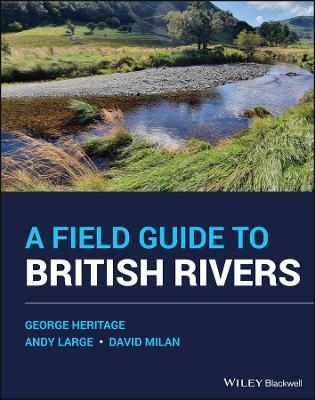
A Field Guide to British Rivers
Seiten
2021
Wiley-Blackwell (Verlag)
978-1-118-48798-3 (ISBN)
Wiley-Blackwell (Verlag)
978-1-118-48798-3 (ISBN)
Temperate rivers are influenced by many factors including geology, climate, soils, sediment type, flow, as well as human activity. The complex interactions of the non-anthropogenic controlling factors have led to a wonderful diversity of river type throughout the British Isles. Sadly, almost all rivers in the UK have suffered significant and long-lasting modification by unsympathetic management, that has all but destroyed this variety, creating watercourses that are simplified conduits for water and sediment, designed primarily to drain the land and reduce flood risk. This volume aims to help reverse this, illustrating using over 200 images and descriptions, this variety of rivers in Britain, highlighting the many forms that temperate river systems take and providing an accessible summary of the underlying river science knowledge base.
A Field Guide to British Rivers covers the full range of upland and lowland channel types and describes the full variety of substrate conditions from bedrock through boulder, cobble and gravel, to silt dominated systems. The authors describe examples gathered from their extensive research and practical experience working with rivers throughout mainland Britain and set those examples in their wider landscape context to exemplify the natural functioning of temperate river types. This book offers a practical and contextualised guide to contribute to efforts towards the sympathetic and sustainable restoration and re-naturalisation of degraded channels in the UK. Offering a unique viewpoint of both the underpinning science and the practicalities of river management, A Field Guide to British Rivers is an essential a stand-alone guide for anyone involved in river restoration and management as well as for those simply interested in rivers in general.
Written as a field guide to demonstrate practical examples of river types, and to highlight the pressures they experience and their often-parlous condition, this book is intended to better inform both river management approaches and the policy necessary to achieve this. Fundamentally, the authors seek to demonstrate how the hydrological, geomorphological, and ecological functions of rivers and their catchments are inexorably intertwined, and together how they generate and maintain rivers as dynamic entities.
A Field Guide to British Rivers covers the full range of upland and lowland channel types and describes the full variety of substrate conditions from bedrock through boulder, cobble and gravel, to silt dominated systems. The authors describe examples gathered from their extensive research and practical experience working with rivers throughout mainland Britain and set those examples in their wider landscape context to exemplify the natural functioning of temperate river types. This book offers a practical and contextualised guide to contribute to efforts towards the sympathetic and sustainable restoration and re-naturalisation of degraded channels in the UK. Offering a unique viewpoint of both the underpinning science and the practicalities of river management, A Field Guide to British Rivers is an essential a stand-alone guide for anyone involved in river restoration and management as well as for those simply interested in rivers in general.
Written as a field guide to demonstrate practical examples of river types, and to highlight the pressures they experience and their often-parlous condition, this book is intended to better inform both river management approaches and the policy necessary to achieve this. Fundamentally, the authors seek to demonstrate how the hydrological, geomorphological, and ecological functions of rivers and their catchments are inexorably intertwined, and together how they generate and maintain rivers as dynamic entities.
About the Authors Dr George Heritage is a Director of the applied environmental consultancy Dynamic Rivers. Dr Andy Large is Professor in River Science at the University of Newcastle. Dr David Milan is Senior Lecturer in Physical Geography at the University of Hull.
Foreword ix
1 British Rivers: Status and Condition 1
2 River Types: A Brief Overview 9
3 River Types: Observations and Theory 19
4 “Reading” Rivers 123
5 Towards Sensitive and Appropriate Management 159
References 167
Place and River Index 187
Subject Index 189
| Erscheinungsdatum | 06.04.2021 |
|---|---|
| Verlagsort | Hoboken |
| Sprache | englisch |
| Maße | 216 x 279 mm |
| Gewicht | 851 g |
| Themenwelt | Naturwissenschaften ► Geowissenschaften ► Geologie |
| Naturwissenschaften ► Geowissenschaften ► Hydrologie / Ozeanografie | |
| ISBN-10 | 1-118-48798-2 / 1118487982 |
| ISBN-13 | 978-1-118-48798-3 / 9781118487983 |
| Zustand | Neuware |
| Informationen gemäß Produktsicherheitsverordnung (GPSR) | |
| Haben Sie eine Frage zum Produkt? |
Mehr entdecken
aus dem Bereich
aus dem Bereich
Schulbuch Klassen 7/8 (G9)
Buch | Hardcover (2015)
Klett (Verlag)
31,50 €
Buch | Softcover (2004)
Cornelsen Verlag
25,99 €


